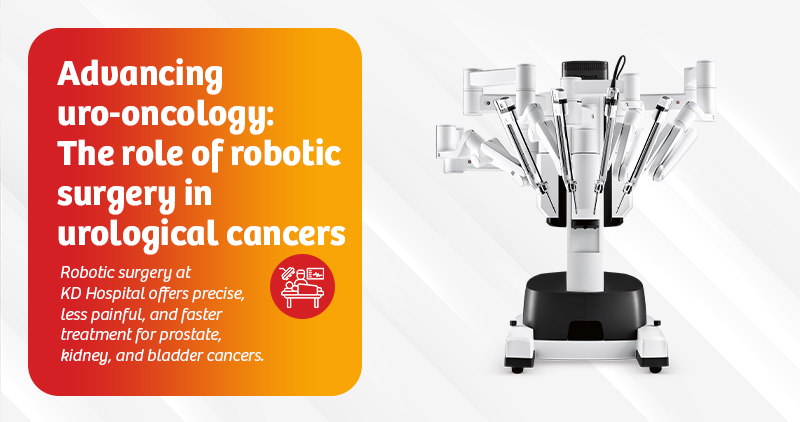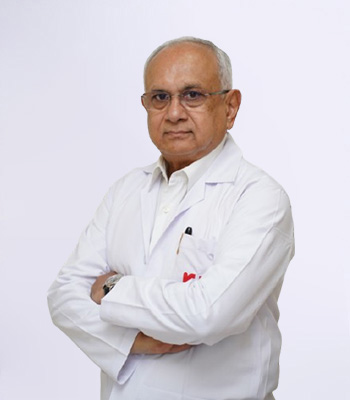

By Dr Janak Desai
Senior Consultant - Urology & Robotic Surgeon
May 16, 2025
Discover how robotic-assisted surgery at KD Hospital is transforming the treatment of urological cancers like prostate, kidney, and bladder cancer—offering patients greater precision, less pain, faster recovery, and improved functional outcomes.
Among these, prostate cancer is the most common urological malignancy, affecting older men, while kidney and bladder cancers impact both genders, albeit more frequently in males. Testicular cancer, although relatively rare, remains the most common solid tumour in young adult men. Adrenal tumours are less frequent but often challenging to diagnose due to their nonspecific symptoms and potential hormonal activity.
Historically, urological cancers have been associated with male patients, given the anatomical and hormonal differences. However, in recent years, there has been a noticeable and steady rise in the incidence of certain urological cancers, such as bladder and kidney cancers, among women. This trend underscores the importance of increasing awareness, improving screening protocols, and promoting timely medical evaluations across all populations. As these cancers continue to rise in prevalence, particularly in ageing populations, the demand for precise diagnostics, minimally invasive treatment modalities, and personalised cancer care becomes more critical than ever before.
The World Health Organisation's Global Cancer Observatory (GLOBOCAN) provides comprehensive statistics on cancer incidence:
New cases (2022): Approximately 37,948 cases, accounting for 2.7% of all new cancer cases in India.
New cases (2022): Estimated at 22,548 cases, making up 1.6% of all new cancer cases.
Source:https://gco.iarc.who.int/media/globocan/factsheets/populations/356-india-fact-sheet.pdf
Over the last two decades, the management of urological cancers has undergone a revolutionary transformation due to the emergence of robotic-assisted surgery. This minimally invasive technique has transformed the treatment of complex urological cancers, leading to better outcomes, shorter recovery times, and reduced blood transfusion rates and complications.
When people hear 'robotic surgery', many imagine a robot operating independently on the patient. However, this is a common misconception.
In reality, robotic-assisted surgery is not performed by autonomous machines. The surgeon is entirely in control of the procedure, seated at a console that allows for enhanced precision, dexterity, and visualisation. The robot replicates the surgeon's hand movements in real-time, using slender, articulated instruments inserted into the patient through small incisions.
Rather than replacing surgeons, the robot acts as an extension of their skills, providing unparalleled access and accuracy, especially in hard-to-reach anatomical areas like the pelvis and retroperitoneum.
It enables a level of finesse that is difficult to achieve with traditional open or even laparoscopic surgery.
Robotic surgery in urology offers not just from a surgical standpoint but also patient comfort, faster return to normal activities, and improved long-term outcomes. Some of the most significant advantages include:
These advantages collectively contribute to not only improved survival outcomes but also a better quality of life post-surgery.
Robotic-assisted radical prostatectomy (RARP):
For men diagnosed with localised prostate cancer, robotic-assisted radical prostatectomy (RARP) has become the gold standard of care. Compared to open or traditional laparoscopic surgery, RARP offers superior functional and oncological outcomes.
Advantages:
With the robot's enhanced dexterity, surgeons can perform nerve-sparing procedures more effectively, a critical factor in preserving quality of life post-surgery.
Robotic partial and radical nephrectomy:
Renal cell carcinoma (kidney cancer) is often managed surgically, with the approach depending on tumour size and location.
Robotic radical cystectomy with intracorporeal urinary diversion:
Bladder cancer, especially in its invasive form, often necessitates complete bladder removal. Traditionally, this has been a highly morbid surgery. With robotic radical cystectomy, outcomes have improved dramatically.
Advantages:
Robotic retroperitoneal lymph node dissection (RPLND):
In select cases of testicular cancer — particularly early-stage non-seminomatous germ cell tumours — robotic RPLND is a highly effective, minimally invasive alternative to traditional open surgery.
Advantages:
Robotic adrenalectomy:
Adrenal tumours, whether functional (hormone-producing) or non-functional, often require surgical removal. Robotic adrenalectomy offers superior access and control, especially when dealing with tumours near vital vascular structures.
Advantages:
KD Hospital: Leading the robotic surgery in Gujarat
At KD Hospital, we have one of Gujarat's most advanced robotic (Da Vinci X) uro-oncology combining precision technology with expert care.
Our state-of-the-art robotic systems, with a highly trained team of urologic and oncologic surgeons.
We understand that every patient's cancer journey is personal. That is why we tailor our surgical approach to each individual — aiming not only for effective disease control but also for preserving dignity, independence, and quality of life after treatment. Our goal is to deliver the highest standards of cancer care with minimal disruption to daily life, ensuring that recovery is as smooth and empowering as possible.
Robotic surgery is not the future anymore, IT IS HERE:
The role of robotic surgery in urological cancer management is rapidly expanding. As technology advances, we expect to see even greater integration of AI-driven tools, enhanced imaging modalities, and precision-guided surgical planning — all aimed at further improving patient outcomes.
For patients diagnosed with prostate, kidney, bladder, testicular, or adrenal cancers, robotic-assisted surgery represents more than just a technological innovation — it symbolises hope, healing, and a higher standard of care.
If you or your loved one is facing a diagnosis of urological cancer, trust the experts at KD Hospital. Our commitment to excellence, combined with cutting-edge robotic technology, ensures that your journey to recovery is guided by precision, compassion, and innovation.
Advanced robotic uro-oncology surgery at KD Hospital – because you deserve the best.